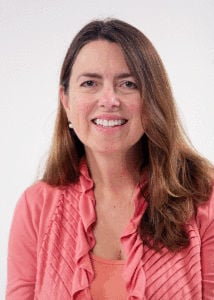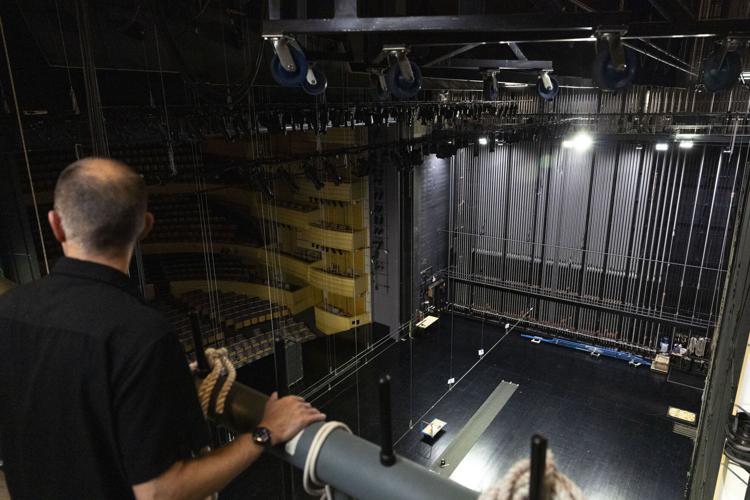The Madison arts philanthropist who donated $205 million to build the Overture Center for the Arts has made another substantial gift to ensure the building’s longevity.
Jerry Frautschi pledged $10 million as part of a $30 million campaign to fund capital projects and an endowment for the Downtown arts center on the eve of its 20th anniversary, Overture officials announced Thursday night.

High above the stage of Overture Hall, director of production John Penisten shows where improvements are being made. Madison philanthropist Jerry Frautschi has pledged $10 million to help modernize the 20-year-old Overture Center for the Arts.
After two decades of heavy foot traffic and performance use, the 400,000-square-foot building at 201 State St. is in need of repairs and upgrades, Chief Development Officer Emily Gruenewald said.
“We do over 700 events a year throughout the facility, so our building gets a lot of wear and tear,” she said.
“It’s just the natural cycle for buildings with this level of volume. Just like my own house is 20 years old, and we no longer are just fixing things — it’s (about) replacing the roof, the appliances,” she said. With Overture, “it’s the same thing, but magnified on a much larger scale.”
People are also reading…
With more than seven performance areas and four art galleries, Overture Center provides about 500,000 individual “arts experiences” a year. Spaces such as the 2,255-seat Overture Hall, the 1,089-seat Capitol Theater, and the 347-seat Playhouse theater serve as performance homes to nine resident arts companies, including the Madison Symphony Orchestra, Madison Opera, Forward Theater and Madison Ballet. Touring Broadway shows often sell out most of Overture Hall during multi-show runs.
Audience members experience only about a quarter of the building’s space — the rest of the functions are behind the scenes, Gruenewald said.
For example, crews are replacing the rigging system from which lights, curtains and scenery hang over the Overture Hall stage. And work to refurbish the floor of the Capitol Theater stage — worn from 20 years of hard use — also will begin soon.
Showing its age
Designed by renowned architect Cesar Pelli, the Overture Center with its elegant exterior has become a landmark on Madison’s State Street. But many of its needed improvements are less glamorous. Some can save money in the long run, said Gruenewald, like the recent installation of water softeners at Overture that cut down on hard-water wear and help save on plumbing, pipe and fixture costs.
“We have 24 roofs and they have a lifespan of about 20 years, so we will also be addressing roof issues,” she said. “Definitely we are looking at our chiller, with a lifespan of about 20 years — and here we are, coming up on 20 years and looking at a more energy-efficient way of cooling air.”
One of Overture’s half-dozen boilers has gone offline, and lighting systems are in the process of being upgraded to LED in stages. The sound and lighting consoles used in performance spaces “are generally antique after about eight years, because technology advances so much,” Gruenewald said. “In order to be competitive and support the performances that are coming through, we need to continue to invest in all that theatrical equipment as well.”

Director of production John Penisten speaks about the new control interface that will be installed at the Overture Center for the Arts as part of upgrades in the 20-year-old building.
The idea of creating a capital needs endowment has been around since Overture was built, she said, but really began gaining steam “seven or eight years ago” at the urging of then-board member Dianne Christensen, who in 2018 made a gift of $500,000 to establish the endowment and now is the campaign’s honorary chair.
The current goal is to add to that endowment so it can grow while other new funds are used to address immediate building needs, Gruenewald said. So far, a total of $21.8 million has been raised for the “Overture Forever Campaign,” including the $10 million pledge from the W. Jerome Frautschi Foundation.
Historic donation
Frautschi’s nine-figure donation to build the Overture Center for the Arts remains the largest single gift to the arts in U.S. history.
A University of Wisconsin graduate who for decades helped run his family’s Madison printing company, Webcrafters, Frautschi was an early investor in his wife Pleasant Rowland’s educational doll company, later known as American Girl and sold to Mattel in 1998 for $700 million.
Frautschi and Rowland have contributed hundreds of millions of dollars to many of the city’s major projects, including Overture, the Madison Youth Arts Center, Central Library, the Wisconsin Youth Symphony Orchestras’ new building on East Washington Avenue, UW Hospital, the Center for Black Excellence and Culture, the Urban League of Greater Madison’s new Black Business Hub on South Park Street, One City Schools and the Boys and Girls Clubs of Dane County.
In recent years, Frautschi also has donated more than $25 million to the future $160.5 million Wisconsin History Center to be built on Capitol Square.
Behind the scenes, 'he's always singing.'
“When I made my gift for the development of the Overture Center, my vision was to create a world-class arts destination that would become the cultural hub of Madison,” Frautschi said in a statement released by Overture. “As we celebrate Overture’s 20-year anniversary, its success has exceeded even my most ambitious hopes and expectations.”
Powerful memories
Overture’s presence had a $34.1 million economic impact in the nine-month period following the center’s nearly 18-month shutdown due to the COVID-19 pandemic. The center has not done a more recent economic impact study, but “our business has grown a lot since that time,” Gruenewald said. Free and low-cost programs, such as school field trip performances, make up 30% of visits to Overture, she said.
An independent nonprofit, Overture lists its current events and shows at overture.org. The 2024-25 season of touring Broadway shows begins Nov. 26 with “& Juliet.”
Audience members and others can donate to the Overture Forever Campaign through the website overture.org/give/overture-forever, Gruenewald said.

Mike Jonas of Clearwing Systems Integrations wires in new control electronics Thursday on the forestage grid in Overture Hall.
“It’s been phenomenal to see the support from the organizations and individuals we’ve spoken to, and just to hear their stories about what Overture means to them and what they see it brings to the community,” she said.
Families have reminisced about attending shows since the days of the Civic Center, Overture’s predecessor, while others have told stories about their children who gained confidence after appearing in a production at the arts center.
“That’s been the most powerful piece of this journey,” she said.















